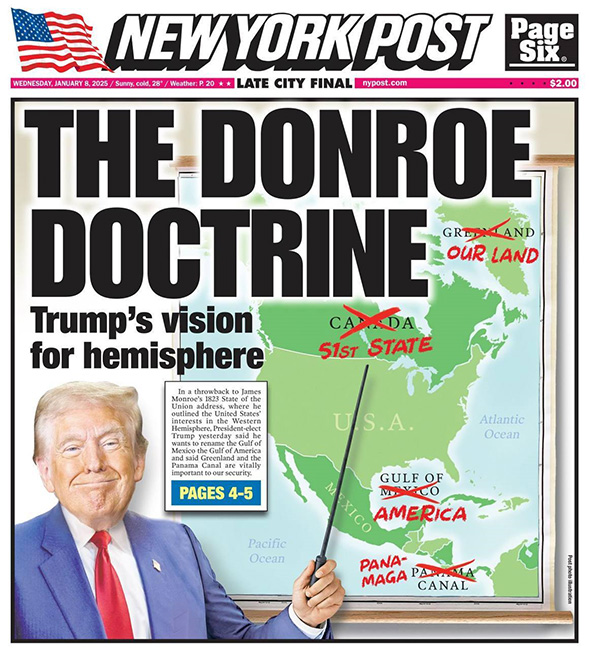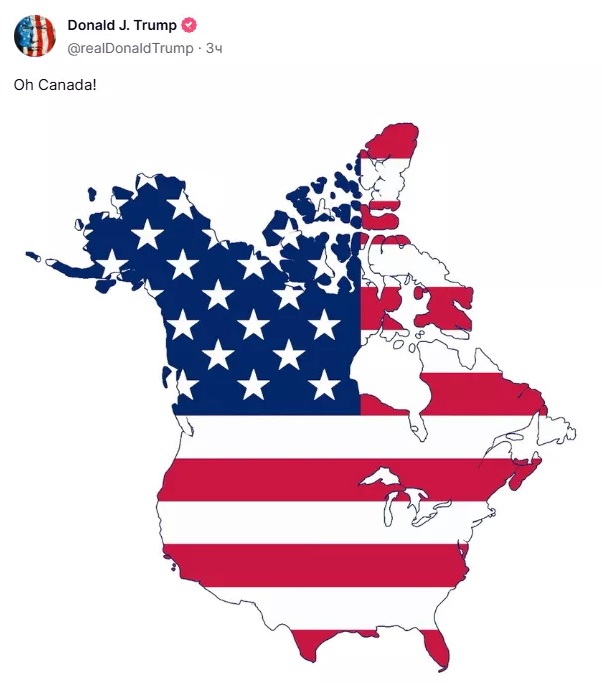
Donald Trump Jr. landed in Greenland, the Arctic island his father, President-elect Donald Trump, has expressed a strong desire to purchase, despite sharp statements from Greenland that it is not for sale.
Trump Jr. framed the trip as “a little bit of fun,” telling CNN, “as an outdoorsman, I’m excited to stop into Greenland for this week.”
But the trip has fueled speculation about what exactly his father’s plans are for this Arctic territory.
In December, Trump revived calls made in his first presidency for US ownership of Greenland, calling it “an absolute necessity.” Asked at a Tuesday news conference whether he would rule out using “military or economic coercion” to gain Greenland — or Panama, which Trump has also expressed desire to own — the president-elect responded, “No, I can’t assure you on either of those two, but I can say this: We need them for economic security.”
The president-elect says owning Greenland is vital for US security, but experts say he may also be eyeing other aspects of Greenland such as its trove of natural resources — including rare earth metals — which may become more accessible as climate change melts the territory’s ice.
Greenland is the world’s largest island and home to more than 56,000 people. A former Danish colony and now an autonomous territory of Denmark, it occupies a unique geopolitical position, sitting between the US and Europe. Its capital city Nuuk is closer to New York than it is to Denmark’s capital Copenhagen.
It’s long been seen as key for US security, said Ulrik Pram Gad, a senior researcher at the Danish Institute for International Studies. The Northwest Passage shipping lane runs along its coast and the island is part of the Greenland-Iceland-United Kingdom gap, a strategic maritime region.
The US is keen to ensure “no hostile great powers control Greenland, because it can be a foothold for attacking the US,” Pram Gad told CNN.
What might be even more appealing to Trump, however, is Greenland’s rich deposits of natural resources, said Klaus Dodds, professor of geopolitics at Royal Holloway, University of London.
These include oil and gas, as well as the rare earth metals in high demand for the electric cars and wind turbines of the green transition, as well as for manufacturing military equipment.
Currently China dominates global rare earth production and has already threatened to restrict the export of critical minerals and associated technologies, ahead of Trump’s second term.
“There is no question at all that Trump and his advisers are very concerned about the stranglehold that China appears to have,” Dodds told CNN. Greenland offers a potentially rich source of these critical minerals, he added.
Melting ice and rapidly rising Arctic temperatures are giving Greenland a front-row seat to the climate crisis, but some also see economic opportunities as climate change reshapes the country.
“Trump, I think, instinctively gets the idea that the Arctic is melting,” and the perceived opportunities, Dodds said. Although he cautioned, in reality, conditions along these routes are still often treacherous, and melting ice may make waters even more dangerous to navigate.
There is also a suggestion that melting ice may make natural resources easier to access, but the climate crisis has not yet proved much of a “game-changer” for this, said Phillip Steinberg, a geography professor at the University of Durham.
It’s not that climate change is making Greenland’s resources more accessible, he told CNN, but rather “more necessary.”
This raises a very intriguing question, Dodds said. “What would Greenland do if Trump offered, say, $1 billion a year to have a different kind of association?”
Some Greenlandic politicians have been floating the idea of a special association, similar to the one the US has with the Marshall Islands, where Greenland has sovereignty but also financial support from the US, in exchange for agreements on certain US strategic interests.
Danish officials say they don’t necessarily agree — a frank conversation about Trump’s remarks, rather than assuming he isn’t serious, will likely be the only way to stave off a crisis, they told CNN.
To that end, Danish Foreign Minister Lars Lokke Rasmussen signaled on Wednesday that the country wants to discuss the issue more with the incoming Trump administration.
“We are open to a dialogue with the Americans on how we can possibly cooperate even more closely than we do to ensure that the American ambitions are fulfilled,” Rasmussen told reporters. The US has long worked closely with Denmark in the Arctic and in Greenland, where the US maintains its northernmost military base.
Trump also warned that Denmark could face steep tariffs if it does not give up control of Greenland and refused to rule out military action to take it by force.
Trump’s comments are already creating tension with US partners and allies. Greenland’s prime minister, Mute Egede, signaled on Tuesday that the territory does not want to engage in the political back-and-forth between the US and Denmark.
“Greenland belongs to the people of Greenland,” he said. “Our future and fight for independence is our business.”
France and Germany also responded on Wednesday, with German Chancellor Olaf Scholz saying, “The principle of the inviolability of borders applies to every country… no matter whether it’s a very small one or a very powerful one,” and French Foreign Minister Jean-Noël Barrot said, “There is obviously no question that the European Union would let other nations of the world attack its sovereign borders.”
The US defense official said that at the very least, Trump’s comments have added urgency to an already important discussion about the Arctic’s value to US national security interests.
“It demonstrates that this place, Greenland, has tremendous geostrategic value to the world,” he said.
Greenland’s public broadcaster has been canvassing residents’ opinions on US President-elect Donald Trump’s pitch to buy the autonomous Danish territory – and some of their responses might raise some eyebrows.
While some of those questioned described Trump’s interest as “dangerous” and “worrying,” others suggested they might “have more trust in Trump” and “choose the USA.”
However, debate over Greenland’s future has been stirred up by growing speculation over its independence movement.
In his recent New Year’s speech, the Greenland prime minister said the island should break free from “the shackles of colonialism” – though the speech did not mention the United States.
P.S. The statement, issued by the minister for statehood and foreign affairs, Vivian Motzfeldt, said the government recognised Greenland’s “decisive and important role for the US’s national security interests”, which is why, it said, it houses a US military base. It added: “Greenland looks forward to working with the incoming US administration and other Nato allies to ensure security and stability in the Arctic region.”
P.P.S. American senators have discussed the possibility of including Canada as the 51st state of the United States with the newly elected US President Donald Trump, CNN reporter Haley Talbot said, citing Oklahoma Senator Markwayne Mullin. "We talked a lot about Canada becoming the 51st state," the journalist quoted the senator's words on his social network page.

read more in our Telegram-channel https://t.me/The_International_Affairs

 11:52 10.01.2025 •
11:52 10.01.2025 •






















